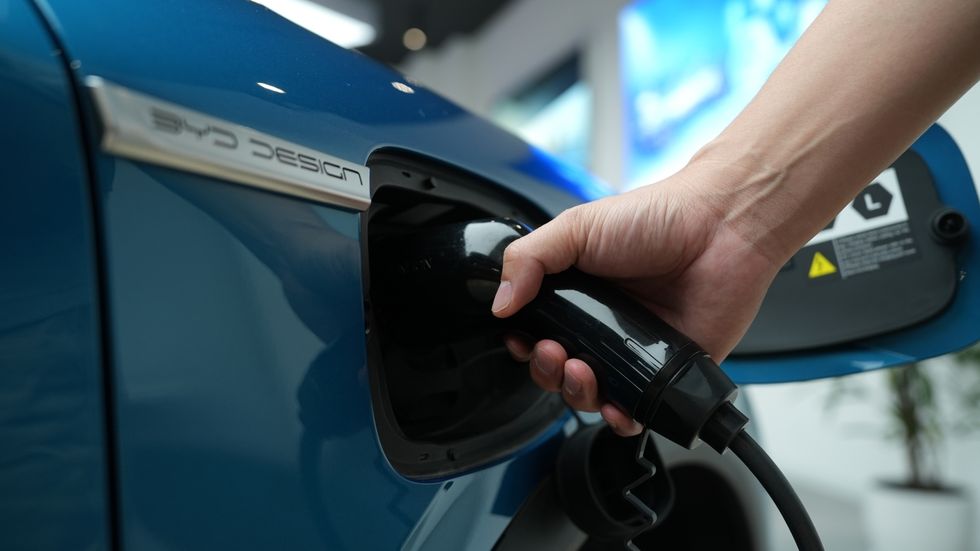MacGregor supplies equipment for 12 PCTCs
NewsMacGregor secured an order to supply cargo access equipment for 12 CIDO Shipping PCTCs, with options for 8 more, with deliveries from 2026 to 2029.
There are shortages in car carrying capacity, especially in China, where the export of electric vehicles has soared in the past two years.

The recent Chinese Government Work Report, unveiled on Tuesday, spotlights the nation’s automotive industry, particularly highlighting the impressive advancements in Chinese new-energy vehicle (NEV) manufacturing and sales throughout 2023, the Global Times reported.
Notably, domestic auto brands have surpassed joint ventures in passenger car sales, solidifying the NEV sector as a pivotal component of China’s expanding manufacturing strength. Against this backdrop, the pressing issue of bolstering ocean shipping capacity for Chinese-made NEVs has garnered increasing attention.
A deputy to the National People’s Congress (NPC) emphasized the need to address shortages and bottlenecks in China’s Ro-Ro cargo vessel capacity to enhance the transportation infrastructure for the country’s surging NEV exports.
Deputy Yan Keshi submitted a proposal during the ongoing NPC session in Beijing, highlighting the critical challenge posed by limited Ro-Ro vessel capacity, which is impeding the export of Chinese NEVs and demanding immediate action.
Yan proposed initiatives aimed at fostering enduring collaboration among ship manufacturers, ports, and other stakeholders to scale up sustainable Ro-Ro vessel production and enhance the logistical support for NEV exports, both in terms of hardware and software optimization.
Meanwhile, Nikkei Asia reported that BYD, the leading Chinese electric vehicle manufacturer, intends to expand its car carrier fleet to eight within the next two years, to enhance its export capabilities, as China’s dominance in new energy vehicles extends to maritime transport.
“BYD plans to deploy seven car carriers over the next two years to address the shortage of shipping capacity for automobile exports,” stated Wang Chuanfu, the company’s founder and Chairman, last month.
CSSC Offshore & Marine Engineering, a subsidiary of China State Shipping Corporation, is also undertaking the construction of two vessels capable of transporting 7,000 BYD vehicles each. The construction of these vessels has already commenced in Guangzhou.
BYD experienced monthly growth in overseas NEV sales throughout the year, achieving a total of 240,000 units for the full year.

On the other hand, Seoul-based Hyundai Glovis, which is one of the world’s largest operators of Pure Car and Truck Carrier (PCTC) ships, in December 2023 has exercised newbuild options on four 10,800 CEU capacity LNG-fuelled ships. It brings to 10 the number of this size of PCTC, which are ranked as the largest in the world, the carrier has on order in China.
Hyundai Glovis’s latest deal involves Guangzhou Shipyard International and Shanghai Waigaoqiao Shipbuilding each constructing two ships. The two yards each secured three ships in the order that the carrier placed in late 2023.
However, Hyundai Glovis is not directly financing or owning any of the tonnage. Instead, deals have been agreed with domestic shipowner HMM, Vancouver (BC)-based shipowner Seaspan Corp – three ships each – and in the case of the latest contract with Korea Ocean Business Corp to charter the tonnage for 20 years once it is delivered.
The ships will be delivered during 2026 and 2027 and be deployed mainly in Hyundai Glovis’s export trades out of Asia.
Currently, there are shortages in car carrying capacity in several markets in the region and especially in China where the export of electric vehicles (EVs) has soared in the past two years.
In 2023, China’s vehicle exports surged to 4.9 million units, marking a 58% increase from 2022 and surpassing Japan to become the world’s leading exporter.
In 2023, an estimated 3M EVs were shipped out of Chinese ports with containers having to be used in some trades as a result of purpose designed PCTC tonnage not being available.
Overall, UK-based shipbroker and maritime services company Clarksons, estimated the total trade at 23.7M CEU in 2023, up 17% on 2022’s total and over 10% ahead of its previous record (21.5M CEU) attained in 2018.
Meanwhile, the global demand for EVs remains strong as governments across the world encourage and put in place legislation to switch motorists from petrol- and diesel-fuelled vehicles to electric.
Since COVID-19, charter rates for PCTCs have also increased sharply and for ships with capacities in the 6,500 to 7,000 CEU range now average in excess of US$110,000 per day. This is up from US$17,000 per day in 2020 when the sector was negatively impacted by the pandemic.
In many respects, the two orders reflect the confidence that Hyundai Glovis has in the sector and also the company’s own environmental objectives of reducing its emissions. The automotive logistics group plans to have at least 27 LNG-fuelled ships in its fleet by 2027. The 10 ships represent a total investment of more than US$1.2B.